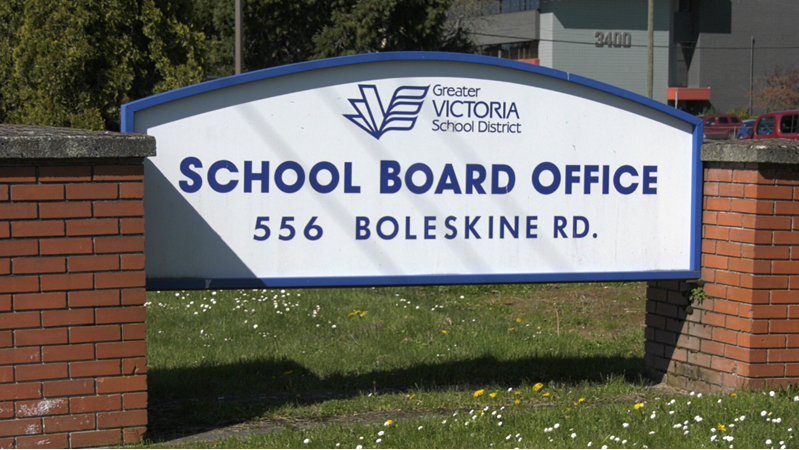Victoria school board votes to end police liaison program
 The Greater Victoria School District office is pictured: April 12, 2021 (CTV News)
The Greater Victoria School District office is pictured: April 12, 2021 (CTV News)
The Greater Victoria School District (SD61) board is following through with is controversial decision to end the school police liaison program.
Earlier this year, the Greater Victoria Teacher's Association brought forward concerns, saying that it believed school police liaison officers (SPLOs) had a negative effect on students, particularly Black, Indigenous, People of Colour (BIPOC), 2SLGBTQIA+, and people with disabilities.
The school board listened to these concerns and unanimously decided to end its SPLO program at a special board meeting Wednesday.
Other concerns raised by the school board included a lack of clear guidelines and oversite for SPLO activities in schools, and tasking police officers with issues they may not be trained for.
The school board approved three motions at its meeting Wednesday:
• To end its SPLO program while updating its policies around school emergencies – such as lockdowns – and asking superintendents to give SD61 a list of services that will no longer be offered by SPLO's, with recommendations on how to replace them.
• Urging the province to research the impacts of SPLO's on students.
• Asking that the province to fund community alternatives to SPLO's, like social workers, community coaches and restorative justice initiatives.
At the meeting, SD61 board chair Nicole Duncan said that she believed having professionals in mental health and substance use was a better alternative than having police officers provide guidance on these issues – saying that other professionals would not attempt to do a police officer's job, so police should not attempt to take on other professionals' roles.
HEATED DEBATE
The decision to end the program did not come without pushback.
Leading up to the vote Wednesday, local police leaders said it was important to have officers spend time at schools.
"This program is critical to the safety of youth in our community," said Victoria police Chief Del Manak after the Greater Victoria Teacher's Association first brought its concerns forward in March.
"This program also allows us to deal with worrisome behaviours that are not criminal, but are beyond the capacity of school teachers and counsellors to manage. That is the reality of what is happening in our local schools today," he said.
At the school board meeting Wednesday, Saanich police Chief Dean Duthie also voiced support for keeping SPLOs in schools, saying they helped teach students about bullying, bike safety, online safety and drug and alcohol use.
Officers could also intervene and help students "avoid what could result in criminal consequences" later down the line.
"I've been told time and time again that not only do students learn from us, but that we learn from them," said Duthie.
Meanwhile, a lack of research about the impacts of SPLOs in schools was considered by both sides of the argument.
The Greater Victoria Teacher's Association said that SPLOs should not be in schools until further research on their potential harms and benefits to students could be studied further, while Manak argued that the officers should not be removed, since it's unclear if potential harms outweigh the potential benefits.
The Victoria Principals' and Vice Principals' Association also voiced support for keeping SPLOs in schools, while the Support Network for Indigenous Women and Women of Colour argued that having police in schools had a negative impact on students.
"There have been many positive interactions through the SPLO program, but undeniably there are some students and staff who do not feel safe with police in schools," said Duncan in a statement Thursday.
"The decision to end the program speaks to the board’s commitment to provide trauma informed support and inclusive spaces for all students."
CTVNews.ca Top Stories

LIVE UPDATES Rain reduces wildfire activity, aids firefighters: Jasper park officials
Jasper National Park officials said Thursday night that rain over the day resulted in "minimal fire behaviour and spread."
Canadian Olympic Committee removes women's soccer team's head coach over drone scandal
The Canadian Olympic Committee has removed women's national soccer team head coach Bev Priestman over a drone scandal, according to a press release from the organization.
Yukon woman narrowly escapes bear attack, credits hair clip
A woman in Yukon believes her hair clip helped save her during a bear attack.
Prince William's 2023 salary revealed in new report
Newly released financial reports show that William, the Prince of Wales, drew a salary of $42.1 million last fiscal year, his first since inheriting the vast and lucrative Duchy of Cornwall.
'I was just shocked': Jasper lodge owner on seeing property destroyed by wildfire
On Wednesday night, the owner of Maligne Lodge in Jasper, Alta., was shocked to receive a photo of her business engulfed in flames.
Mary-Ellen Turpel-Lafond likely has Indigenous DNA: report
The Law Society of British Columbia says a DNA test shows a former judge and Order of Canada recipient accused of falsely claiming to be Cree "most likely" has Indigenous heritage.
U.S. authorities have arrested 'El Mayo' Zambada, a historic leader of Mexico's Sinaloa cartel
Ismael 'El Mayo' Zambada, a historic leader of Mexico's Sinaloa cartel, and Joaquin Guzman Lopez, a son of another infamous cartel leader, were arrested by U.S. authorities in Texas on Thursday, the U.S. Justice Department said.
Harris pushes Netanyahu to ease suffering in Gaza: 'I will not be silent'
U.S. Vice President Kamala Harris pressured Israeli Prime Minister Benjamin Netanyahu on Thursday to help reach a Gaza ceasefire deal that would ease the suffering of Palestinian civilians, striking a tougher tone than President Joe Biden.
'She led it the whole way': 18-year-old B.C. woman leads hikers to safety in Jasper National Park
As fire threatened people in Jasper National Park, Colleen Knull sprung into action.

































